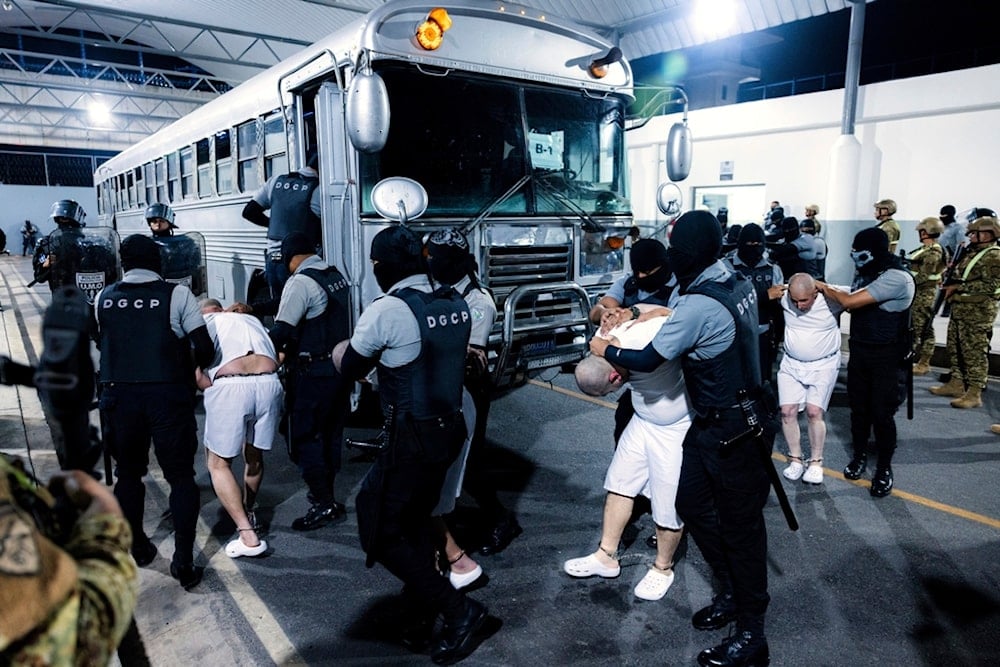US immigrants held in appalling conditions at Djibouti base: Intercept
ICE detainees face illness, heat, and poor care at Camp Lemonnier in Djibouti as the Trump administration expands its global deportation network.
-

In this photo provided by El Salvador's presidential press office, guards transfer deportees from the US to the Terrorism Confinement Center in Tecoluca, El Salvador, Monday, March 31, 2025 (El Salvador presidential press office via AP)
A senior US Immigration and Customs Enforcement (ICE) official testified Thursday to the "appalling and unsafe conditions" facing deportees and the government personnel guarding them at a US military base in the Horn of Africa nation of Djibouti, The Intercept reported.
Melissa Harper, deputy director of ICE’s Enforcement and Removal Operations, submitted a sworn court declaration describing the state of detainees housed at Camp Lemonnier.
Harper detailed 100-degree (Fahrenheit) temperatures, inadequate medical care, risk of malaria, and constant exposure to toxic smoke from burn pits.
“The aliens are currently being held in a conference room in a converted Conex shipping container on the U.S. Naval base in Camp Lemonnier,” Harper stated in federal court in Massachusetts.
“This has been identified as the only viable place to house the aliens.”
Eight detainees originating from Cuba, Laos, Mexico, Myanmar, South Sudan, and Vietnam, were transferred to Djibouti after the Trump administration attempted to deport them to South Sudan.
A US judge intervened, halting the deportations on the grounds that the men had not been granted due process. Harper revealed that both ICE agents and detainees became ill within 72 hours of arrival, exhibiting symptoms including coughing, fever, and difficulty breathing.
ICE medical staff, she said, lacked adequate testing or sufficient medication to properly treat the illnesses.
“Djibouti utilizes burn pits as a way of disposing of trash and human waste,” Harper noted, adding that the smog from these pits was causing respiratory issues among officers.
She also cited logistical strain on military operations at the base, with Department of Defense (DOD) staff expressing concern over the proximity of detainees with violent criminal records.
Read more: At least 50 migrants deported to El Salvador prison entered US legally
Legal battle stalls deportations to South Sudan
A US District Judge had previously blocked deportations to South Sudan, stating that the government must provide detainees with an opportunity to challenge their removal. The Trump administration responded by relocating the detainees overseas while continuing to argue its case in court.
Trina Realmuto, legal counsel for the detainees, condemned the administration’s move. She told The Intercept that "the judge gave the government a choice as to how to remedy the government’s violation of the court’s order, either return them and comply with the order in the United States or comply with the order overseas."
“The government opted to comply overseas after telling the court they had the ability to do so. This is a situation the government both created and can remedy if it so chooses."
The Intercept mentioned that the Djibouti case is part of a broader strategy by the Trump administration to establish what critics are calling a “global gulag” for expelled immigrants.
In addition to Camp Lemonnier and Guantanamo Bay, Washington has either sought or established deportation arrangements with over 20 countries, including Angola, El Salvador, Moldova, and Uzbekistan, some of which have been previously condemned by the US State Department for human rights violations.
Camp Lemonnier, the largest US military installation in Africa, has been used with minimal public oversight. Requests for information about the detainees' welfare have been deflected.
As ICE struggles to maintain surveillance and provide care with limited medical supplies, human rights lawyers and advocates continue to raise alarms.
“We continue to be concerned about the health and safety of the men who are being subjected to these conditions,” Realmuto said.
So far, ICE has not disclosed a detailed update on the detainees’ current health status, nor clarified how long they will remain imprisoned under these conditions.
Read more: Protests erupt in Los Angeles after immigration raids, ICE detentions

 4 Min Read
4 Min Read










